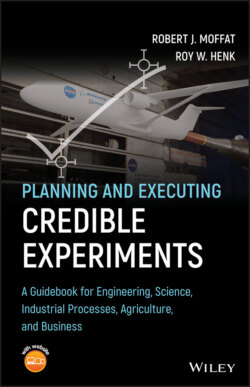Читать книгу Planning and Executing Credible Experiments - Robert J. Moffat - Страница 10
Оглавление
About the Authors
Dr. Robert J. Moffat is Professor Emeritus at Stanford University and former President of Moffat Thermosciences, Inc. Professor Moffat started his professional career at the General Motors Research Laboratories in the Gas Turbine Laboratory. He and a small group of engineers designed, built, and tested a high efficiency, two‐spool regenerative gas turbine that, starting from 30 below zero Fahrenheit, could deliver 350 HP in less than 2 minutes. He graduated from the University of Michigan and received his Master of Science at Wayne State University. Enrolling at Stanford University, he earned degrees in Mechanical Engineering as Master of Science, Engineer, and Ph.D. He became a Stanford professor and served as chairman of the Thermosciences Division for 13 years.
Professor Moffat’s research efforts have involved three areas: convective heat transfer in engineering systems, experimental methods in heat transfer and fluid mechanics, and biomedical thermal issues. His largest body of work concerns convective heat transfer. One program focused on gas turbine blade heat transfer. A second program aimed at convective cooling of electronic components covering forced, free and mixed convection. Several contributions arose including invariant descriptors, a new heat transfer coefficient for electronics cooling, and a simple correlation based on turbulence intensity.
His second area of research concerned experimental methods in the thermosciences namely full‐field imaging techniques for temperature, heat flux, and heat transfer coefficient measurement using thermochromic liquid crystals. He contributed regularly to the theory of uncertainty analysis. Dr. Moffat was an invited lecturer for 40 consecutive years in the Measurement Engineering Series, for more than 20 years in the Instrument Society of America Test Measurements Division and, for ten years in the ASME Professional Development program.
Dr. Moffat worked on biomedical engineering problems, in particular the thermal protection of newborn infants. He jointly developed a self‐contained, portable incubator which provided a neutral thermal environment for the infant while allowing free access by the attending physicians. Used on almost every continent where cold‐weather transport is needed, it received the ASME Holley Medal Award, 1987. He founded Moffat Thermosciences as a vehicle for consulting, research, and teaching in Heat Transfer and Experimental Methods. He delivered short courses in Electronics Cooling, Experimental Methods, and Uncertainty Analysis.
Dr. Roy W. Henk, professor in the Graduate School of Energy Science at Kyoto University, Japan, earned his bachelors degree at Virginia Tech and his masters and doctorate at Stanford University. Professor Henk taught courses within natural and experimental philosophy, currently known as classical physics and mechanical engineering.
Professor Henk’s experience includes industry, government labs, and academia. His work included wind tunnel tests at Virginia Tech and Japan’s Mach 5 tunnel at NAL, and water tunnels at the U.S. Naval Research Lab and at Stanford. He worked internationally in the aerospace industry, designing and testing advanced engine components with IHI (). He spearheaded im‐provements to the turbine engine design process. A registered Professional Engineer, Dr. Henk is keenly interested in appropriate energy.
Dr. Henk’s recent work focused on experimental methods. He has done diverse experiments, from field work on environmental flows, to tests in pristine laboratories, to materials tests for structures. He founded Royal HanMi to promote international energy science and design of experiments.
Professor Henk has taught at universities, public and private, internationally as well as in the USA. Two of Dr. Henk’s courses, Experiment Design and Statistical Modeling, drew students from the medical school, business, engineering and environmental schools. Researchers learned advanced strategies to select data and how to draw strong defensible conclusions from data.
Together with colleagues at Kyoto University (), Science University of Tokyo, IHI, and Tokyo University they helped the nation brave the impact of the Fukushima Tsunami. Together with colleagues at LeTourneau, Virginia Military Institute, Handong () University, he trained our future. Dr. Henk has served within the Commonwealth of Virginia’s Governor’s Schools and STEM Academies.
Dr. Henk’s youth science book, UnLock Rocks, explores how rocks and crystals reveal the age of the Earth. Simple experiments, using kitchen ingredients, make concepts tangible and tasty. Two books were published in South Korea.
Titles
UnLock Rocks
Physics 1 Lab with Experiment Design (RoK)
Physics 2 Lab with Experiment Design (RoK)
with R.J. Moffat
Planning and Executing Credible Experiments
